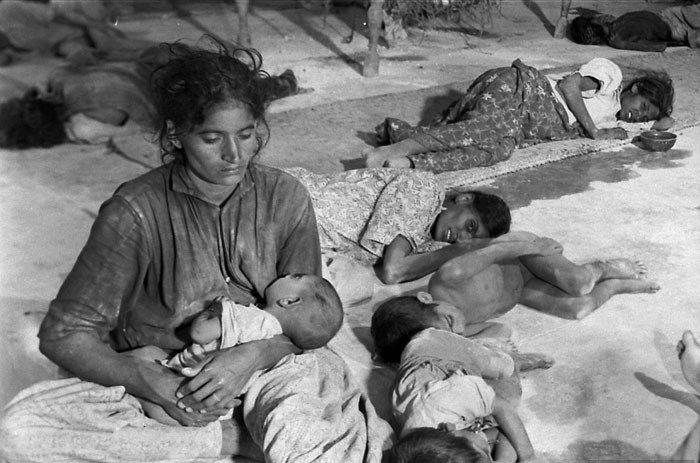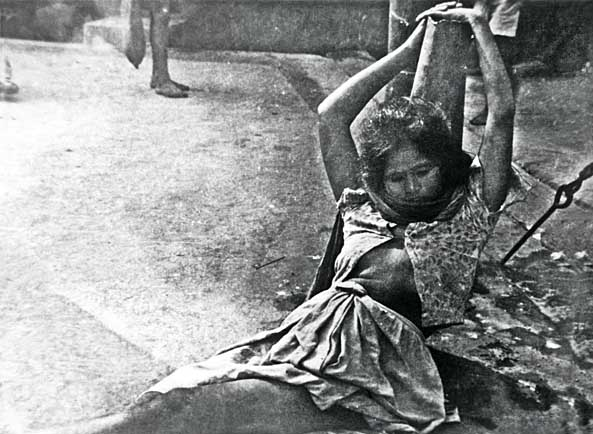THE special train left Amritsar at two in the afternoon, arriving at Mughalpura, Lahore, eight hours later. Many had been killed on the way, a lot more injured and count-less lost.
It was at 10 O’clock the next morning that Sirajuddin regained consciousness. He was lying on bare ground, surrounded by screaming men, women and children. It did not make sense.
He lay very still, gazing at the dusty sky. He appeared not to notice the confusion or the noise. To a stranger, he might have looked like anold man in deep thought, though this was not the case. He was in shock, suspended, at it were, over a bottomless pit.
 Then his eyes moved and, suddenly, caught the sun. The shock brought him back to the world of living men and women. A succession of images raced through his mind. Attack… fire… escape … railway station … night … Sakina. He rose abruptly and began searching through the milling crowd in the refugee camp.
Then his eyes moved and, suddenly, caught the sun. The shock brought him back to the world of living men and women. A succession of images raced through his mind. Attack… fire… escape … railway station … night … Sakina. He rose abruptly and began searching through the milling crowd in the refugee camp.
He spent hours looking, all the time shouting his daughter’s name …Sakina! Sakina!… but she was no where to be found.
Total confusion prevailed, with people looking for lost sons,daugh-ters, mothers, wives. In the end Sirajuddin gave up. He sat down, away from the crowd, and tried to think clearly. Where did he part from Sakinaand her mother? Then it came to him in a flash – the dead body of his wife, her stomach ripped open. It was an image that wouldn’t go away.
Sakina’s mother was dead. That much was certain. She had died in front of his eyes. He could hear her voice:“Leave me where I am. Take the girl away.”
The two of them had begun to run . Sakina’s dupatta had slipped to the ground and he had stopped to pick it up and she had said: “Father, leave it.”
He could feel a bulge in his pocket. It was a length of cloth. Yes, he recognised it. It was Sakina’s dupatta, but where was she?
 Other details were missing. Had he brought her as far as the railway station? Had she got into the carriage with him? When the rioters had stopped the train, had they taken her with them?
Other details were missing. Had he brought her as far as the railway station? Had she got into the carriage with him? When the rioters had stopped the train, had they taken her with them?
All questions. There were no answers. He wished he could weep, but tears would not come. He knew then that he needed help.
A few days later, he had a break. There were eight of them, young men armed with guns. They also had atruck. They said they brought back women and children left behind on the other side.
He gave them a description of his daughter. ”She is fair, very pretty. No, she doesn’t look like me, but her mother. About seventeen. Big eyes,black hair, a mole on the left cheek. Find my daughter. May God bless you.”
The young men had said to Sirajuddin: “If your daughter is alive, we will find her.”
And they had tried. At the risk of their lives they had driven to Amritsar, recovered many women and children, and brought them back to the camp,but they had not found Sakina.
On their next trip out, they had found a girl on the roadside. They seemed to have scared her and she had started running. They had stopped the truck, jumped out and runafter her. Finally, they had caught upwith her in a field. She was very pretty and she had a mole on her left cheek. One of the men had said to her:”Don’tbe frightened. Is your name Sakina?”Her face had gone pale, but when they had told her who they were, she had confessed that she was Sakina, daughter of Sirajuddin.
The young men were very kind to her. They had fed her, given her milk to drink and put her in their truck. One of them had given her his jacket so that she could cover herself. It was obvious that she was ill-at-ease without her dupatta, trying nervously to cover her breasts with her arms.
Many days had gone by and Sirajuddin had still not had any news of his daughter. All his time was spent running from camp to camp, looking for her. At night, he would pray forthe success of the young men who were looking for his daughter. Their words would ring in his ears “If your daughter is alive, we will find her.”
Then one day he saw them in the camp. They were about to drive away.“Son,” he shouted after one of them,“have you found Sakina, my daughter?”
“We will, we will,” they replied all together.
The old man again prayed for them. It made him feel better.
That evening there was sudden activity in the camp. He saw four men carrying the body of a young girl found unconscious near the railway tracks.They were taking her to the camp hospital. He began to follow them.
He stood outside the hospital for some time, then went in. In one of the rooms, he found a stretcher with some-one lying on it.
A light was switched on. It was a young woman with a mole on her leftcheek. “Sakina,” Sirajuddin screamed.
 The doctor, who had switched on the light, stared at Sirajuddin.
The doctor, who had switched on the light, stared at Sirajuddin.
“I am her father,” he stammered.The doctor looked at the prostrate body and felt for the pulse. Then he said to the old man: “Open the window.”
The young woman on the stretcher moved slightly. Her hands groped for the cord which kept her salwar tied around her waist. With painful slowness, she unfastened it, pulled the garment down and opened her thighs.
“She is alive. My daughter is alive,” Sirajuddin shouted with joy.
The doctor broke into a cold sweat.
(Translated by Kavita Chiranji)
Courtesy: Manushi)
Saadat Hassan Manto (1912-1955) is the most famous Urdu short story writer of the Indo-Pak subcontinent. His pen is a ruthless knife of a surgeon trying to remove cancerous lump from body of the patient.




